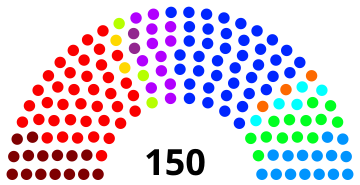auntblabby wrote:
in countries with parliaments, don't they have to form coalition gov'ts? are they proportionally elected?
The parliamentary system means that the executive branch of government can only remain in power as long as they have support from the legislative branch (congress, lower house, sejm, the word varies by country). If they lose the majority, new elections will be held.
Most countries on continental Europe are like that, and they have proportional representation as well. With proportional representation it is very unlikely for any single party to gain a majority, so it will usually have to be a coalition government with two or more parties.
Britain has a parliament and since the last election they have something that looks like proportional representation (more or less), but before that had a first past the post system I think.
I found this on wikipedia, a list of countries that currently have a coalition government. Nearly all European countries have one, and some consists of four or more parties. Finland even has six parties in their current government coalition, and Italy seven (! !! !):
http://en.wikipedia.org/wiki/List_of_countries_with_coalition_governmentsThis is the situation in the Netherlands after the 2010 election (from
http://en.wikipedia.org/wiki/House_of_Representatives_(Netherlands))
I think it has changed a little since then, because some elected party members left their party (or were kicked out) but they can retain their seat as independents. The largest party has 41/150 seats so they need another party to get to the required 75+1.














